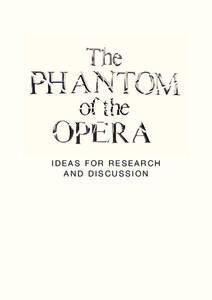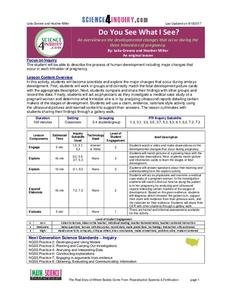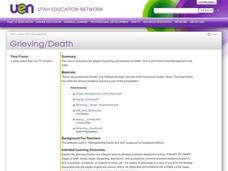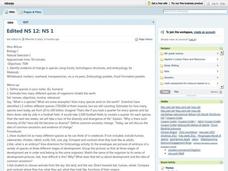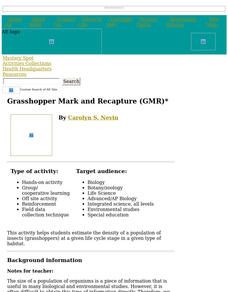Digital History
The Boston Massacre
What better way to get your class interested in history than to embody important historical characters and make events come to life? Stage a realistic mock trial of the British soldiers accused of murdering five Bostonians after the...
Poetry Society
War Horse and WWI Poetry
Here's a resource that deserves a place in your curriculum library. As part of their study of War Horse individuals create an anthology of World War I poetry.
Phantom of Opera
The Phantom of the Opera: Ideas for Research and Discussion
You could spend a full day discussing The Phantom of the Opera and not scratch the surface, but a set of lessons about the literary elements and themes of the musical production is a great start. Young thespians build upon the background...
Science 4 Inquiry
Do You See What I See?
In only nine months, a small group of cells grows into a fully developed baby. Pupils learn about the development of an embryo to a fetus to a baby. They identify each step of weekly development. Young scientists look at ultrasounds to...
Mary Pope Osborne, Classroom Adventures Program
Dinosaurs Before Dark
Young readers travel back to the time of the dinosaurs in this literature unit based on the story Dinosaurs Before Dark. Intended for use with upper-elementary special education students, this resource provides reading comprehension,...
Broward County Schools
ABC’s of Bullying Prevention
What is the problem? Why should I care? What can I do about it? These three questions are at the heart of a program designed to lead young people to understand that the way to prevent bullying is for their Attitude and Behavior to Change...
Curated OER
Zebrafish as a Model for Muscle Development
Young scholars explore the steps of protein synthesis in zebrafish. They view video clips to identify the parts of a zebrafish and observe them as they sequence the developmental stages. In groups they identify the muscles and how...
Curated OER
What Have Scientists Learned About Stars
In this stars worksheet, students will compare the stages in the life cycle of an average star and a massive star. This worksheet is a graphic organizer.
Curated OER
Cell Division: The Cell Cycle and Mitosis
Students will be able to identify the different stages of the eukaryotic cell cycle as well as the different stages of mitosis in the proper order. Students will also be able to recognize what organelles of the cell are integral to...
Curated OER
Digital Research: The Michigan of Today
Fourth graders explore present day life in Michigan with the past. They compare information on various aspects of Michigan. Students research rural life, city life, tourism, and agriculture. They create a PowerPoint presentation on their...
Curated OER
"Honey Dew from Bunny Too!"
The students will design a lab to test the mechanism that triggers spore dispersal. They should have some clues after making observations of the life cycle. Part of the fun here is to let the students devise a method for testing this...
Curated OER
What's Happening to Our Caterpillars?
Seventh graders participate in a lesson making observations of caterpillars. They identify different changes in the life cycle of a caterpillar and also understand the final result of the life cycle ending.
Curated OER
Mitosis
Seventh graders describe the stages of mitosis. In this biology lesson, 7th graders explain the importance of cell division. They complete an activity packet at the end of the lesson.
Curated OER
Magical Metamorphosis
Students explore the life cycle of the butterfly and the process of metamorphosis through the creation of painted life cycle habitat. They place each part of the cycle in the correct location through the use of a visual diagram.
Curated OER
Oyster Culture Cycle Worksheet
For this oyster culture cycle worksheet, students answer 31 questions about the six stages of the oyster culture cycle. They also answer questions about the oyster business.
Curated OER
Grieving/Death
Learners discuss the stages of grieving and reactions to death. They list the steps of the grieving process and how to develop a positive adjustment to loss. They study The 'Rape Myths' key (from the Sexual Violations lesson) as part...
Curated OER
Water, Water Everywhere (Pond Animals)
Second graders examine the characteristics of animals who live in a pond environment. In groups, they describe the various stages in the life of a frog and identify the characteristics of other pond animals. Using this information,...
Curated OER
Cell Cycle, Mitosis and Meiosis
Seventh graders describe the processes involved in mitosis and meiosis. In this life science lesson, 7th graders create chromosome models using strings and beads. They play a jeopardy team game at the end of the unit to review concepts...
Curated OER
Natural Selection
Students estimate how many different species of organisms inhabit the Earth. In groups, they match the pictures of embryos at the different stages of development. They compare and contrast animals from the sky, land, and water and...
Curated OER
Forest Succession
Students research environmental change and why forests cannot stay the same for long. In this environmental growth lesson, students discuss the life cycle of a tree and examine tree cookies to discover the age of these specimens....
Curated OER
Words In The News Latin American Migrant Money
Students explore the life of a migrant worker. They compare the life of those living in the United States with a poorer country such as Mexico or Latin America. After looking up the definitions of vocabulary words, groups of students...
Curated OER
Contacting Outer Space
Students read a newspaper article about a compilation of information on human life that is to be projected into outer space from a pyramid in Mexico. They define vocabulary, complete comprehension worksheets, analyze the use of 'to' plus...
Curated OER
The Height of Diplomacy
Students explore issues that might be discussed at the G8 summit meeting hosted by the U.S. after reading and discussing the article "World Leaders Get a Glimpse of America's High Life" from The New York Times. Students work in groups...
Curated OER
Grasshopper Mark and Recapture (GMR)
Learners estimate the density of a population of insects (grasshoppers) at a given life cycle stage in a given type of habitat.
Other popular searches
- Human Life Span Stages
- Four Stages of Frog Lifecycle
- Life Cycle Stages
- Human Stages of Life
- Insect Stages of Life
- Life Span Stages
- Four Stages of Frog Life Cycle
- Star Stages of Life
- Earthworms Life Cycle Stages
- Monarch Life Cycle Stages
- Rearrange Stages of Life Cycle




